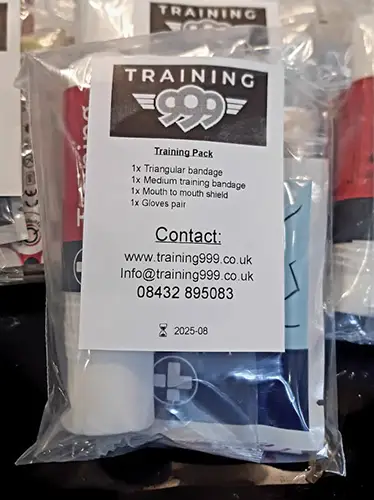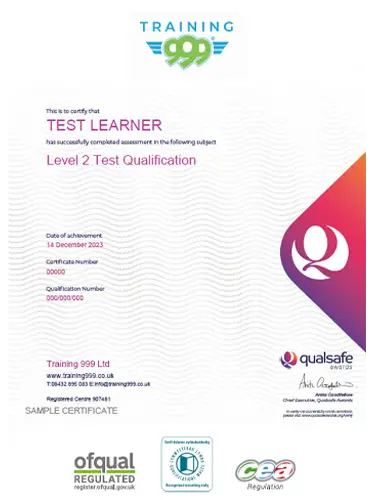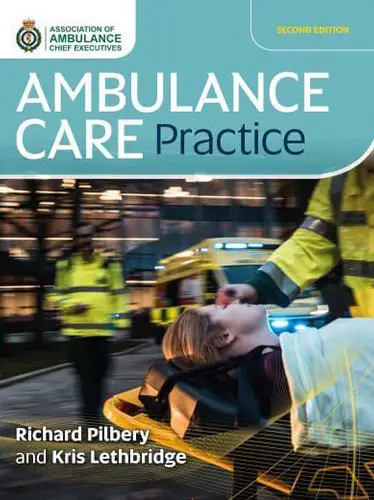FREC 3 Course – First Response Emergency Care Training
Courses / Frec Level 3
Our FREC 3 Course is the leading Level 3 prehospital care qualification, delivered across East Anglia by experienced paramedics. Accredited by Qualsafe, this Level 3 Award in First Response Emergency Care (RQF) equips emergency responders with essential life-saving skills that exceed HSE first aid requirements. Perfect for those seeking careers in ambulance services, event medical cover, or roles in high-risk environments across Norfolk, Suffolk, Cambridgeshire, and beyond. Over 5 days, you’ll fulfill PHEM Level D competencies and forms the first step toward becoming a registered paramedic. We deliver on-site training throughout East Anglia, bringing professional emergency care education directly to your workplace.
FREC 3 Course Overview - Level 3 First Response Emergency Care
The FREC 3 course is a comprehensive 5-day qualification that prepares you to respond effectively to emergency situations. Accredited by Qualsafe and endorsed by the Royal College of Surgeons of Edinburgh, this nationally recognised qualification meets all PHEM Level D competencies and exceeds HSE first aid requirements.
- Duration: 5 Days, 37 hours,
- Delivery: 37 hrs face-to-face & 18hrs Self directed Study
- Qualification: First Response Emergency Care Level 3 (RQF), Accredited by an Ofqual Regulated Awarding Body.
What's Included in Your FREC 3 Training
- 5-day training course.
- First Aid Training Pack for each student containing CPR Face-shield, training bandage, triangular bandage, and gloves.
- Training on both Semi automatic and Fully automatic AED's
- Training on all 3 types of Adrenaline Auto Injectors. Jext, Emerade, and Epipen.
- Full Colour Ambulance Care Essentials/Ambulance Care Practice Manual (E-PDF) or Hardback.
- Taught at your premises.
- First Response Emergency Care Level 3 (RQF) Certificate via PDF valid for 3 years**
- Taught by a Paramedic.



*Regulated Qualifications Framework (RQF) ** For each successful Learner
Qualification & Accreditation - Qualsafe Level 3 RQF
Qualification & Accreditation – Qualsafe Level 3 RQF
This course is the Qualsafe Level 3 Award in First Response Emergency Care (RQF), endorsed by the Faculty of Pre-Hospital Care and The Royal College of Surgeons of Edinburgh.
The qualification is regulated by Ofqual and meets all competencies set out in the Pre-Hospital Emergency Medicine (PHEM) skills framework at descriptor Level D.
This qualification is recognised by:
– NHS Ambulance Services across the UK
– Security Industry Authority (SIA) for Close Protection Officer licensing
– Emergency services (Police, Fire & Rescue)
– Private and voluntary ambulance services
When used as part of the FREC suite of nationally recognised pre-hospital medical qualifications, you can progress from Community First Responder to trainee ambulance crew roles, to autonomous ambulance clinician, and ultimately to HCPC registered Paramedic at Level 6.
FREC 3 Course Content - Emergency Care Training Syllabus
Our FREC 3 course covers all essential competencies required for Level 3 First Response Emergency Care. Over 5 days, you’ll gain practical, hands-on experience in managing prehospital emergencies, from life-threatening trauma to medical conditions. This comprehensive curriculum ensures you’re fully prepared to respond confidently in high-pressure situations.
Patient Assessment & Management
- Structured patient assessment
- Mechanism of injury and incident
- Recording assessment findings
- Responding to changes in risk and/or threat
Life-Saving Interventions
- Life threatening bleeding control
- Airway management and emergency oxygen
- Breathing difficulties (trauma and medical)
- Adult, child and infant BLS and AED usage
Trauma & Medical Care
- Prehospital trauma care
- Prehospital emergency medical care
- Environmental exposure
- Immersion and submersion incidents
Operational Skills
- Role and responsibilities of a first responder
- Operational readiness and human factors
- Emergency services capabilities
- Primary triage (Ten Second Triage) and lifesaving interventions
- Moving and handling: in an emergency and assisting a clinician
Career Pathway - From FREC 3 to Registered Paramedic
Career Pathway – From FREC 3 to Registered Paramedic
The FREC Progression Route (Levels 3-6)
FREC 3 is the first step in a progressive suite of qualifications leading to paramedic registration. The course suite is a stage-by-stage modular process – you must start at Level 3, pass each qualification, and progress to the next.
– Level 3 (FREC 3): Foundation level – Community First Responder, Event Medic, Security Medic
– Level 4 (FREC 4): Trainee Emergency Care Assistant / Associate Ambulance Practitioner
– Level 5 (FREC 5): Autonomous non-registered Healthcare Professional (EMT/AAP)
– Level 6: Diploma in Paramedic Practice (RQF) – HCPC registered Paramedic
At Level 6, learners can register with the Health and Care Professions Council (HCPC) and use the legally protected title of “Paramedic”.
Alternative to University Paramedic Degrees
Alternative to University Paramedic Degrees
The FREC pathway offers a vocational, modular learning route for those who prefer practical training over three years at university. Popular with NHS ambulance services, independent ambulance services, voluntary ambulance services, and military personnel, this qualification provides an accessible entry point into pre-hospital care.
Successful completion aims to progress learners toward autonomous clinician roles. Previously known as Emergency Medical Technicians, qualified professionals are now commonly known as Associate Ambulance Practitioners in the NHS Ambulance Service.
Accreditation of Prior Learning (APL) Options
If you have prior medical experience (e.g., military medic, NHS training at ECA level or above), you may be eligible for APL. This is assessed on a case-by-case basis. For example, a military medic may be able to provide evidence of some of the competencies required.
Contact us to discuss your experience and potential fast-track options.
Book Your FREC 3 Course Today
Who Should Take the FREC 3 Course?
Who Should Attend?
The FREC 3 course is ideal for:
– Emergency Services: Police officers, firefighters, search and rescue teams
– Healthcare Professionals: Those seeking ambulance service careers, Community First Responders
– Event Medical Staff: Festival medics, sports event cover, concert medical teams
– Security Personnel: Door supervisors, close protection operatives (SIA recognised)
– High-Risk Environments: Construction, offshore workers, confined space workers, remote location teams
– Utilities & Energy: Power station workers, energy sector personnel
– Military Personnel: Armed forces seeking additional medical qualifications
– Career Changers: Those wanting to enter pre-hospital care without university study
FREC 3 Assessment & Entry Requirements
Who Can Attend FREC 3 Training?
– Minimum age: 17 years old on the first day of training
– Literacy & Numeracy: Level 2 or equivalent recommended
– Prior experience: First aid knowledge helpful but not essential
– Pre-course study: Approximately 18 hours of self-directed reading
Practical & Theory Assessments
To achieve your FREC 3 qualification, you’ll complete:
– 6 practical assessments covering emergency scenarios
– 3 theory assessments (multiple choice question papers)
– 1 invigilated exam
– Continuous formative assessment throughout the course
You’ll have up to 20 weeks to complete any outstanding assessments if needed
FREC 3 Course Pricing - On-Site Training Across East Anglia
Course Costs
Our FREC 3 course is delivered on-site at your premises throughout East Anglia.
Group pricing: Up to 6 learners for £4,500 (£750 per person)
Maximum group size: 6 learners per trainer for optimal learning
What’s included in the price:
– 5-day paramedic-led training at your location
– First Aid Training Pack for each student (CPR face-shield, bandages, gloves)
– Full-colour Ambulance Care Essentials manual (hardback or E-PDF)
– Training on semi-automatic and fully-automatic AEDs
– Training on all 3 adrenaline auto-injector types (Jext, Emerade, EpiPen)
– Qualsafe Level 3 RQF Certificate (valid 3 years)
– All training equipment and materials
Service Areas
We deliver FREC 3 training across Norfolk, Suffolk, Cambridgeshire, Essex, and throughout East Anglia. Training can also be arranged in other regions – please contact us to discuss.
Ready to Book?
Contact us today to discuss your training needs and secure your course dates.
FREC 3 Frequently Asked Questions
Do I need previous first aid experience?
No, but it’s helpful. The course takes you from first aid level to Community First Responder level knowledge. However, having basic first aid understanding will help you get the most from the training.
How long is the FREC 3 certificate valid?
3 years. You can then complete a 2 or 3-day requalification course to renew your certificate, depending on whether you’ve maintained annual BLS refreshers.
Can I progress to become a paramedic through FREC?
Yes. FREC 3 is the first step in the pathway. You can progress through FREC 4, FREC 5, and ultimately achieve a Level 6 Diploma in Paramedic Practice, allowing you to register with HCPC as a paramedic.
Is FREC 3 recognised by the Security Industry Authority (SIA)?
Yes. FREC 3 is one of the few qualifications recognised by the SIA for licensing Close Protection Officers and security personnel.
What happens if I fail an assessment?
You’ll have up to 20 weeks from the course start date to retake any failed assessments. Our trainers will provide support and guidance to help you succeed.
Can you deliver training outside East Anglia?
Yes, we primarily serve East Anglia but can discuss training delivery in other regions across the UK. Contact us to discuss your requirements.
What should I wear and bring?
Wear comfortable, practical clothing suitable for getting on and off the floor during practical scenarios. Bring photo ID for certification purposes. All training materials and equipment are provided.
What if I need to progress to FREC 4?
If progressing to FREC 4, you must complete 118 hours of logged contextualised learning after FREC 3. This can include practice shifts, additional courses, workplace experience, and further reading.
What age do I need to be?
You must be at least 17 years old on the first day of training. There are no upper age limits as long as you’re physically able to participate in practical assessments.
How many people can attend the course?
We train up to 6 learners per course with one trainer to ensure high-quality, personalised instruction. This ratio allows for effective hands-on practice and individual attention.
